NHS announces package of measures to boost performance ahead of winter
The NHS is anticipating a ‘difficult winter’.

Your support helps us to tell the story
From reproductive rights to climate change to Big Tech, The Independent is on the ground when the story is developing. Whether it's investigating the financials of Elon Musk's pro-Trump PAC or producing our latest documentary, 'The A Word', which shines a light on the American women fighting for reproductive rights, we know how important it is to parse out the facts from the messaging.
At such a critical moment in US history, we need reporters on the ground. Your donation allows us to keep sending journalists to speak to both sides of the story.
The Independent is trusted by Americans across the entire political spectrum. And unlike many other quality news outlets, we choose not to lock Americans out of our reporting and analysis with paywalls. We believe quality journalism should be available to everyone, paid for by those who can afford it.
Your support makes all the difference.Social care “traffic control centres” and cash incentives for hospital performance are being announced by the NHS in a bid to drive up care standards.
The NHS in England is announcing a package of measures to improve performance ahead of what is expected to be a “difficult” winter for the service.
Many have said that last winter was one of the worst on record for the health service in England amid soaring demand for care.
And it is expected that the service could also face a surge in demand this winter with officials anticipating a large number of people needing help for respiratory illnesses including flu and Covid.
NHS England said that it is to announce a new financial incentive scheme to encourage local health organisations to “overachieve” on performance measures such as A&E waiting times and ambulance handover times.
It also will announce plans to set up social care “traffic control centres” to help speed up hospital discharges so patients can be shipped out of hospitals when they no longer need to be there.
These hubs, likened to travel agents for social care, will act as a single place for staff to co-ordinate the best and quickest discharge options for patients – either at home or into social or community care.
The centres will bring together experts from across NHS, social care, housing, and voluntary services to help make live decisions on hospital discharge.
Those working in the hubs will be able to access electronic patient records and link up with housing services.
An NHS England spokesperson said that around a quarter of local areas currently offer this service 12 hours a day, seven days a week and this is set to expand to every area of the country by winter.
Boosting the numbers of specialist hubs for patients with respiratory problems means patients can get seen quickly in their local community while also relieving pressure on hospitals
Hundreds of patients are taking up hospital beds across England every day despite being ready to leave, due to hold-ups in sorting transport, medicines and paperwork, or because they have nowhere to be discharged to.
Disagreements between a patient or their family and medical staff, plus the need to install specialist equipment in a person’s home, are among other reasons for delays. But the biggest obstacle to the speedy discharge of patients, who are often elderly and frail, is lack of beds in other settings, such as care homes or community hospitals.
Other plans for winter preparedness will be announced by NHS England at its board meeting in Birmingham on Thursday, including more ambulances on the road, extra beds in hospitals, a ramping up of ‘acute respiratory hubs’ and more “virtual ward” capacity.
Sarah-Jane Marsh, NHS national director of urgent and emergency care for NHS England, said: “Ahead of winter we will not only have more ambulances and beds in place, but we will also be continuing to work more closely as an entire NHS and social care system, increasing the capacity of community services that help keep patients safe at home.
“We will continue to build on this progress and do everything we can to put the NHS on the front foot ahead of what has the potential to be another challenging winter with covid and flu.”
Dr Vin Diwakar, NHS England’s medical director for transformation, added: “The rapid expansion of ‘care traffic control’ centres means patients can be more easily discharged with the right support when medically fit to leave hospital with the latest information available to staff in one spot – this is both better for patients and for the NHS.
“Boosting the numbers of specialist hubs for patients with respiratory problems means patients can get seen quickly in their local community while also relieving pressure on hospitals.
“So while we know this winter is going to be a difficult one, it is important that the public play their part by using services in the usual way – using 999 in an emergency and primary care or 111 online for other health conditions.”